![]()
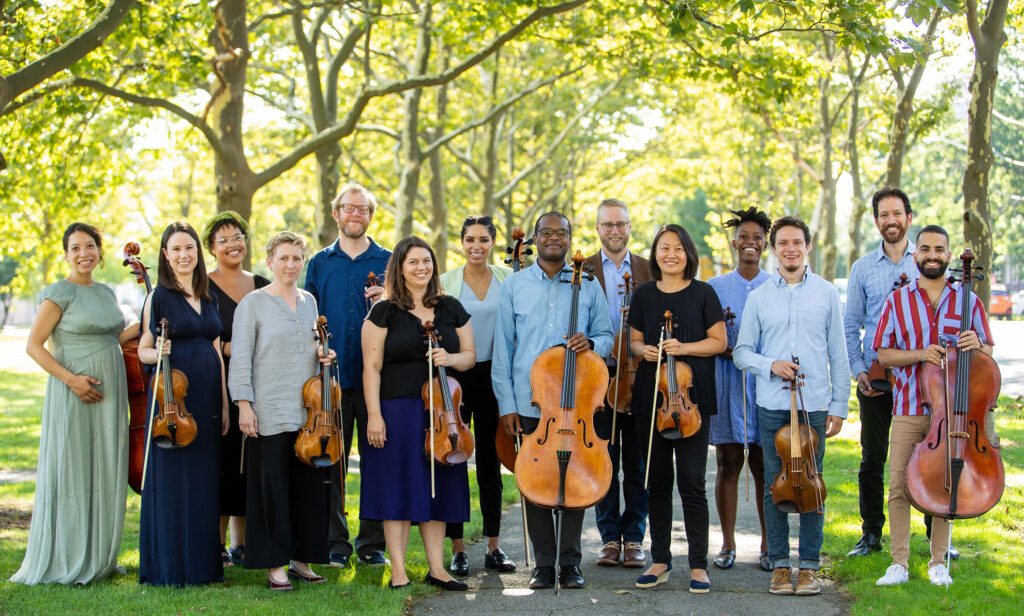
Welcome to Season 25!
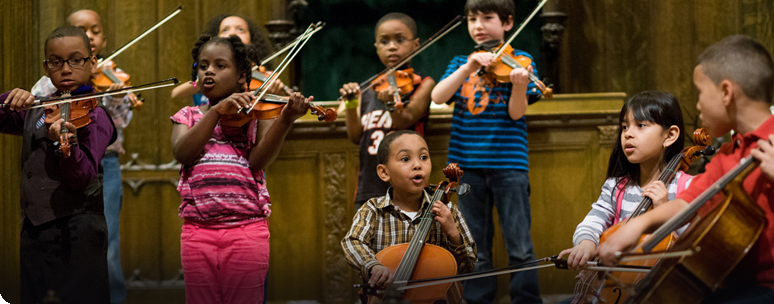
Welcome to Season 25
Welcome to Season 25!Community MusicWorks began in 1997 as an experiment in seeing how musicianship, community-based practice, education, and social justice could be threaded together in ways that enabled musicians to make sustainable and meaningful careers of service to their communities, and for young people and families to engage in meaningful artistic experiences.
In our 25th season, these core ideas remain the motivation for our work.
Along with an ever-present spirit of experimentation and continual evolution, our planning for this milestone season reflects each one of those elements: we are seeding plans for a new building which will serve as a community hub, cultivating the next generation of leadership with the introduction of two Alumni Fellows, and celebrating musical collaborations of the past by bringing back commissioned works and former staff and students to make music with us. And, we are returning to live concerts and in-person music lessons after a year and a half without either.
There is so much to share this year!
Our musicians roll out Season 25 with a round of CMW Delivers, popping up with performances in all 25 neighborhoods of Providence to celebrate the 25th season. The MusicWorks Collective opening concert at the Temple to Music centers around the theme of variation, and our mid-fall program, Songs of Loss, Songs of Healing, honors the many we have lost through disease and violence since the beginning of the pandemic.
We return in spring with Songs of Refuge, a collaboration with Dorcas International Institute and with musicians from the local refugee community. We look forward to featuring both existing and new works by composer Kareem Roustom, celebrating his music as well as his arrangements of songs from Persia, Syria, and Somalia. And our annual Fred Kelley Scholarship Concert will feature an arrangement of Schubert for string quartet with guest tenor Frank Kelley.
And finally, we’ll close this special season in June with hugs, high-fives, and a large reunion ensemble! Our 25th Season Alumni Concert brings together current and former students and staff for a musical celebration with a program featuring a new work by hip-hop violinist and composer Big Lux, who is also this year’s CMW artist-in-residence.
Of course, check our calendar for Student Performance Parties, the return of our Sonata Series, and much more!
Thank you for joining us to celebrate a quarter century and the start of a new chapter.
–Sebastian Ruth, Founder & Artistic Director
In Praise of the ViolaOur Sonata Series premiere shines a spotlight on a frequently maligned instrument: the viola. Often the subject of derision, jokes about the viola abound. Not cool. With this piece, guest pianist (and husband of a violist) Ivan Tan gives the instrument some well-deserved love.
“Its career has been an interesting and singularly checkered one: originally the oldest and most important of the string family, its prestige gradually diminished until it became a mere drudge, necessary for the balance of part-writing, but hardly considered worthy of much notice in itself… …The tone of the viola is apt to become slightly monotonous in an entire recital, as it has not as large or brilliant a range of tone-color as the violin or the cello…” – Rebecca Clarke, “Viola”, Cobbett’s Cyclopedic Survey of Chamber Music (1929)
Though often playing a purely supportive function in ensemble textures, the viola can also be a powerful soloistic force in its own right; the ability of skilled violists to navigate seamlessly between these disparate roles makes them particularly attractive chamber music partners. Especially since the turn of the 20th century, and inspired by pioneering virtuoso performers like Lionel Tertis and William Primrose, composers have written works that showcase the viola’s distinctively dusky timbre. In fact, George Rochberg’s Viola Sonata was commissioned by the American Viola Society in honor of Primrose’s 75th birthday in 1979. Fascinated with the interplay between performers inherent in the duo sonata format, Rochberg had begun working on his own violin sonata in 1942, but abandoned the project after he was drafted into the army. The sonata’s pre-war origins are especially apparent in the first movement, whose harmonic content is influenced by Rochberg’s interest in the music of Béla Bartók. The heart of the piece, however, is the bluesy second movement: Rochberg has written that its “dirgelike, singing character” was what convinced him that the sonata would sound “natural” on the viola. Eventually, Rochberg’s wife Gene convinced him to add a third movement, though Rochberg resisted the traditional “stormy finale” in favor of a short epilogue that contains fleeting reminiscences of themes from the first movement. Unlike Rochberg (whose main instrument was the piano), Rebecca Clarke was a virtuoso violist, and her 1919 Viola Sonata has become a repertory staple. Throughout the sonata, Clarke uses her intimate knowledge of the viola to show off its technical capabilities and timbral palette: the striking cadenza that opens the first movement and the shimmering harmonics in the quicksilver second movement belie Clarke’s description of the instrument as “awkward and difficult,” while more lyrical themes in all three movements explore the viola’s melodic potential. As with Rochberg, Clarke inserts themes from the first movement into a formally looser, almost improvisatory last movement, though here the thematic recall works in favor of a large-scale dramatic ending. The viola’s importance extends behind the scenes of this concert, performed at the Apple Hill Center for Chamber Music in Nelson, NH, where many CMW faculty and students go every year to participate in its Summer Chamber Music Workshop. Mike Kelley, the violist of the Apple Hill String Quartet, recorded and produced the concert, and both Jake and Lisa have studied viola with Lenny Matczynski, Apple Hill’s director. In preparing for this performance, we’ve enjoyed celebrating the longstanding association between Apple Hill and CMW, and prominently featuring a well-deserving but underappreciated instrument! — Ivan Tan, pianist Watch the premiere of Sonata Series Event #1, featuring MusicWorks Collective violists Jake Pietroniro and Lisa Sailer, joined by guest pianist Ivan Tan, for two remarkable duo pieces that showcase the rich and soulful sonorities of the viola.
Thursday, October 14 at 7 pm: The Sonata Series Returns Online!Spotlight on the viola! This season the Sonata Series returns online and presents varied programs with less-often heard works along with several mainstays of the repertoire, and features illuminating conversations with the performers. Sonata Series Event #1 features MusicWorks Collective violists Jake Pietroniro and Lisa Sailer, viola, joined by guest artist Ivan Tan on piano for two remarkable duo pieces that showcase the rich and soulful sonorities of the viola. Join us on YouTube on October 14 at 7 pm EST for Sonata Series Event #1, where the rich and soulful sonorities of the viola are showcased in two remarkable pieces. Twentieth-century American composer George Rochberg wrote serial music for much of his career, but took a sharp turn in style after a tragic life event left him feeling that atonal writing didn’t contain enough expressive range for his grief. His Viola Sonata demonstrates a departure that is romantic in nature with its bold expressiveness, that at times hints of his earlier style. Also featured is the majestic Viola Sonata by Rebecca Clarke, written in 1919 shortly after the composer emigrated to the United States from Britain. From its riveting opening notes, the piece draws the listener into a singular sound world and dramatic arc. Thursday, October 14 at 7 pm EST
Jesse and JoJo on the FarmAt the end of this summer, my partner Ealáin encouraged me to take a retreat to get centered for the upcoming CMW season. After a short look around the internet, a barn loft on a working farm in Willington, Connecticut, popped up on Airbnb for a five day stay. Bluebird Farm is a lovely spot in the town of Willington, a small rural hamlet about thirty minutes from Hartford. While there, I was able to practice, run, meditate, visit friends in nearby Windsor, CT and spend lazy afternoons doing crossword puzzles in the farm’s lovely gazebo. However, I think what was most special to me about my time on Bluebird Farm was the menagerie of animals who lived there. Pigs, sheep, goats, chickens, guinea hens, ducks, and a cow named Jojo lived in harmony in a field next to the barn. Also in residence were eight cats and seven dogs, three of whom were professionals – livestock guardians that kept an eye on all of the animals and looked out for any potential nighttime predators. These working dogs were a lovely breed called Maremma Sheepdogs, and they kept a strict rotating schedule and took no guff from the other animals. The friendliest cat was a large Tom named Jean Valjean who was on regular patrol of the grounds. Carmen, one of the owners of Bluebird Farm, showed me where the grain was kept for the animals, and said I could feed them whenever I wanted. It was awesome to see the goats and sheep emerge from their little shelter to run towards me when I appeared with the grain bucket. Jojo the cow, ½ Angus, ½ Holstein (no relation) would also come running for grain, seemingly unaware of his size or the power of his tongue. Curious about how he would respond to the violin, I played an improvised tune for JoJo, what I’ll call a Bovine Bourrée, and he seemed to enjoy it. Two of the sheepdogs also came over for the short serenade. As you can see from the video, they were an attentive and receptive audience! All in all, a little solitude and quality time on the farm was just what I needed to get ready for Season 25 at CMW. I hope to see you at an event soon. Music-loving barn animals are always welcome! – Jesse Holstein Inspiration from the MusicWorks Network Institute
Inspiration, commitment, and full hearts abound! In late August, participants wrapped up CMW’s fifth annual summer MusicWorks Network Institute by gifting each other heartfelt wishes. Fifty people, including staff members and students from CMW and our peer network organizations, gathered on zoom for workshops, discussions, and sharing around the theme of anti-racist practice.
Participants also engaged in powerful and engaging sessions by a range of presenters:
A concurrent Youth Institute was offered alongside this Institute, with students participating in Wednesday’s keynote and various other Institute workshops, while engaging in sessions tailored specifically for them. Learn more about the MusicWorks Network Summer Institute here. Sonata Series Event #1: Performer Bios
Jake Pietroniro, viola
Watch: The Annual Fred Kelley Scholarship ConcertEnjoy a midsummer musical treat featuring the dynamic duo of violinists Jesse Holstein and Ealaín McMullin!
This year’s online offering of the Fred Kelley Scholarship Concert presents an eclectic program in support of the fund to send CMW students to summer session at Apple Hill Center for Chamber Music.
The Fred Kelley Scholarship was established to support the initiative to send CMW students to Apple Hill in Nelson, New Hampshire. There, CMW’s young artists experience a nurturing and immersive deep dive into the world of chamber music, together with participants from all over the world, within in the majestic beauty of rural New Hampshire.
Since 2007, CMW and Apple Hill have awarded over 50 scholarships to young CMW musicians, made possible by generous donors to the Fred Kelley Scholarship fund.
Make your donation by clicking below, and typing “Fred Kelley” into the comments box:
https://communitymusicworks.org/29may_/donate/ Also, mark your calendar for March 20th, 2022 for the next Fred Kelley Scholarship concert featuring members of the MusicWorks Collective and the fabulous American tenor, Frank Kelley in a performance of Schubert’s incredibly moving song cycle, “Die Schone Mullerin.” The program, featuring violinists Jesse Holstein and Ealaín McMullin, was recorded at Bell Street Chapel in Providence, and at the Apple Hill Center for Chamber Music in Nelson, N.H. THE ANNUAL FRED KELLEY SCHOLARSHIP CONCERT Ishirini Duets on Folk Themes A Tale for Two Violins Ferdinand the Bull for solo violin and narrator
MUSICIAN BIOS: Jesse Holstein, violin Jesse Holstein graduated from Oberlin where he studied with Marilyn McDonald. He then received his Master’s degree with James Buswell at the New England Conservatory. Prior to Oberlin, he studied violin with Philipp Naegele in Northampton, Massachusetts. Jesse would be remiss if he did not send a huge thank you to his wonderful Suzuki teacher Diana Peelle who started him at age 5 and was extremely patient with his posture for years. An active recitalist, orchestral and chamber musician, Jesse is currently concertmaster of the New Bedford Symphony. In recent summers, he has performed at the Bravo! Festival in Vail Colorado, the Montana Chamber Music Festival in Bozeman, the Bay Chamber Concerts in Rockport, Maine, and the Apple Hill Festival in Sullivan, New Hampshire. Jesse also has attended the Violin Craftsmanship Institute in Durham, New Hampshire, where he learned about instrument repair. Since 2013, he has been on the faculty at the Greenwood Music Camp at the foot of the Berkshires in Cummington, Massachusetts. Greenwood is where he himself was bitten by the chamber music bug as a teen. While an undergraduate, Jesse taught for the Oberlin Preparatory Program in the Lorain, Ohio public schools. Also at Oberlin, he served as Assistant Concertmaster and later as Music Director of the Royal Farfissa Disco Juggernaut. Currently, Jesse is a teacher and resident musician for Community MusicWorks and was a founding member of the Providence String Quartet, With the Quartet, Jesse performed with the Muir, Miro, Orion, and St. Lawrence Quartets, as well as pianist, Jonathan Biss; cellist, Matt Haimovitz; Cleveland Orchestra Principal Oboe, Frank Rosenwein, and violist Kim Kashkashian, among others. Community MusicWorks is a youth and family-mentoring program that provides free instruments, lessons and a variety of programs for youth in urban neighborhoods in Providence. Jesse has been a Violin Professeur at L’Ecole de Musique, Dessaix Baptiste in Jacmel, Haiti. He is currently on the faculty at Brown University. One of his interests is how Buddhist mindfulness practice and meditation intersects with teaching and performing music. In the fall of 2013 he was granted a sabbatical from Community MusicWorks to attend the Plum Village Monastery in Bordeaux France. He has a cat, Lord Nelson. Lord Nelson is an ordained on-line minister (this is true) and is available for weddings and services (this is probably not true). Ealaín McMullin, violin Inspired by the opportunity to blend chamber music with education and community building, Ealaín co-founded the Newport String Project (Rhode Island) in 2012. The project is anchored by the community based residency of the Newport String Quartet. Alongside a concert series that takes place in diverse venues throughout Newport, the quartet provides free lessons in violin, viola and cello to forty young students (K-6) in a dynamic youth mentoring program that aims to engage youth who experience economic or other barriers to participation in the arts. Ealaín was first introduced to chamber music through concerts given by the Apple Hill Chamber Players near her home in Donegal, Ireland. This led to many happy summers studying at the Apple Hill Center for Chamber Music in New Hampshire and since 2014, Ealaín has served on the faculty at Apple Hill’s summer festival. She studied at the Boston Conservatory, where she was a member of the Bricolage String Quartet, the Conservatory’s honors ensemble. She has performed with members of the Apple Hill, Brooklyn Rider, Lydian and Miro String Quartets and has performed at the West Cork Chamber Music Festival (Ireland) and Music From Salem (New York). A graduate of Trinity College, Dublin and the Boston Conservatory, Ealaín’s principal teachers have included Michael D’Arcy, Elise Kuder, Mike Kelley and Lenny Matczynski. PROGRAM NOTES: Ishirini is the Swahili word for “Twenty.” It is also the title of American composer Alvin Singleton’s short fanfare for two violins that was commissioned in 2003 to celebrate the 20th anniversary season of the Music from Angel Fire Chamber Music Festival in New Mexico. The two violins do their best to imitate snare drums and a brass band in the opening with both violins playing tremolo chords with tremendous force. A sudden break leaves a descending lyrical snippet atop a lone distant snare drum before returning to the boisterous opening. A quick oscillating chatter and an insistent rhythmic pounding are other principal characters in this pithy but highly dramatic and effective fanfare.
Grazyna Bacewicz was an important Polish composer and violinist whose life was cut short by a heart attack in 1969, one month shy of her 60th birthday. She composed prolifically in her brief life and rose to prominence as a violinist and composer under the specter of the 2nd World War and the Nazi occupation of Poland, but also during the post-war rebuilding of Europe. Her musical language bridges classicism with its reliance on conventional scales and key signatures, and modernism which embraces harmonic dissonance. Also, as a superb violinist, she wrote in a virtuosic style with propulsive rhythmic drive, but also with a lyricism inspired by both the violin’s vocal quality and by folk song. Her Duets on Folk Themes from 1946, like their Hungarian cousins the 44 Duos for Two violins by Bela Bartok, were intended for pedagogical use to not only expand a student’s technique, but to celebrate the folk song, albeit filtered through a more contemporary language. They are a combination of folkloric simplicity of melody, dancing rhythms, deft and organic writing for the violin along with subtly applied harmonic dissonance. They are superbly written for the violin and contains many of her own fingerings and bowings in the parts. They just “lie well in the hand” and are an absolute joy to play. While not as well known as the Bartok duos, they certainly deserve to be.
Written to commemorate the 100th Anniversary of the Armenian genocide, A Tale for Two Violins by the young Armenian American composer Kristapor Najarian is a 7-movement suite that, like the Bacewicz, is heavily influenced by folkloric material. Here are Najarian’s own words about his compositional process and particularly about the Tale for Two Violins. “I wouldn’t say I have any particular philosophy or ‘modus operandi’ when I compose. To me, at this moment, composition feels very spontaneous. If an idea comes to me honestly, in the moment, then I haven’t much need to criticize or change it. Of course, composition is a long process, with much editing and orchestrating involved. However, I feel that every cell of a piece must begin with an honest and spontaneous energy. Just as many streams flow into a single ocean – each with its own natural energy – a composition for me represents thousands of spontaneous instances, woven together to create a piece more meaningful and comprehensive than each of its individual parts. ‘A Tale for Two Violins’ represents this philosophy. The piece is heavily influenced by Armenian, Turkish, and other music from the Middle East, both folk and classical. Two movements are based on traditional Armenian melodies, two on Turkish ones, and two are original.” Indeed, Najarian’s suite is a pastiche of textures, colors, evocative atmospheres and distinct rhythmic grooves that seem intuitive and improvisatory rather than pragmatically planned. The narrative often vacillates between deeply felt lyrical yearning and powerfully driven dance rhythms, though not dance steps we are accustomed to in the West. Another feature heard towards the works opening is a passage that is tuned in quarter tones and not on western classical music keys and scales. It may seem, “out of tune,” but this is a very specific mode of tuning and requires great precision. As Najarian, like Bacewicz, is a violinist, he knows the instrument intimately and uses the full pallet of sound from the violin to great effect.
Finally, a retelling of Munro Leaf’s classic children’s tale, Ferdinand the Bull told through a narrator and a violin with music by the British composer, Alan Ridout. The story will literally speak for itself, but the violin provides the “soundtrack,” as it were, with motifs, melodies, and virtuosic displays representing the drama and characters of the story. On a personal note, in 2019, I was able to perform this at the Apple Hill Center for Chamber Music with my friend, composer and bassoonist John Steinmetz and Munro Leaf’s son was in the audience. I had added quite a few theatrical embellishments to the performance, with snorts, pawing at the ground, leaps and other shenanigans so there was a bit of trepidation as to what Mr. Leaf would think of my additions. Thankfully, he was thrilled and thought that his dad would have loved it! Phew…. -JH Performance videography by Dave Jamrog and Rich Ferri
Meet our Graduating SeniorsThis June, Community MusicWorks is pleased and proud to present the Ninth Annual Senior Gala (watch it online here!) where our graduates played their final performance pieces and teachers, friends, and families payed tribute to Vanessa, Dravy, Roma, Rupert, Cecily, Gaby, Frankie, Sophia-Joy, and Zoe. Take a moment to meet our fabulous 2021 graduating seniors!
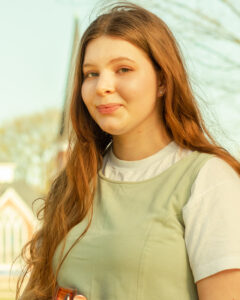
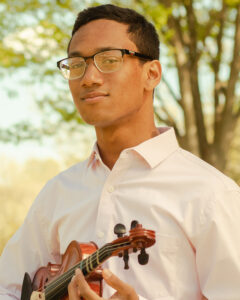
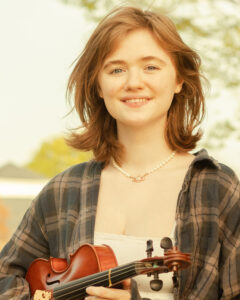
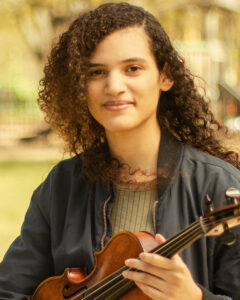
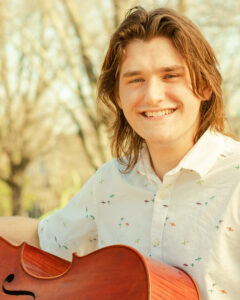
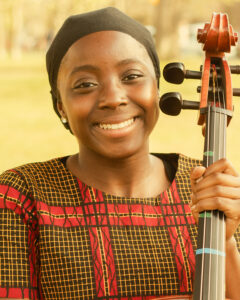
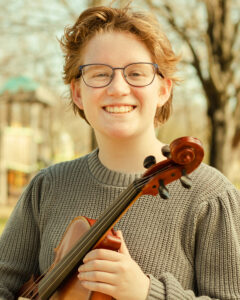
Watch the 2021 CMW Senior Gala here:Watch our Ninth Annual Senior Gala!
This year’s virtual Senior Gala features final student performances from our nine graduates and heartwarming tributes from teachers, family, and friends. The online format gives our seniors the chance to present performances that reflect their creative passions, and this year we’ll feature the voices of the Vanessa, Dravy, Cecily, Rupert, Gaby, Frankie, Sophia-Joy, Zoe, and Roma sharing memories of their years in the CMW community. Click here to watch!
Sunday, April 25 at 7 pm EST: Fellows QuartetWhile the world may never settle back into what is considered normal, music continues to offer refuge. The CMW Fellows Quartet presents a program of works by Caroline Shaw, Leoš Janáček, and William Grant Still that kindle joy, excitement, and deep enjoyment. Get your dancing shoes ready and join us for the premiere on YouTube! CMW Fellows Quartet
Sunday, April 25 at 7pm EST
Premiering on our YouTube channel
|